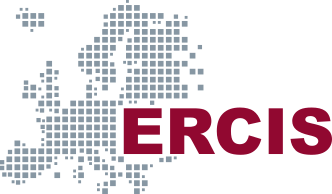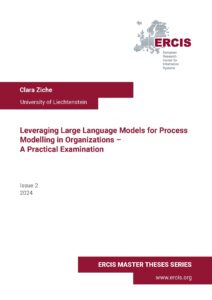Next ERCIS Master Thesis published 🥳
Clara Ziche kicks off 2025 with her Master Thesis published in our “ERCIS Master Theses Series” 🥳
Clara wrote her thesis at the Department Information Systems & Computer Science of the University of Liechtenstein, supervised by Ass. Prof. Giovanni Apruzzese.
The thesis titled “Leveraging Large Language Models for Process Modelling in Organizations – A Practical Examination” has been laudated by Giovanni as follows:
“The thesis presents an exemplary case of “Design Science Research” focused on the practical application of Large Language Models (LLM) for Business Process Modelling (BPM). Specifically, through a case study fostering Hilti, the thesis discusses how to leverage simple LLM-based tools to develop a ChatBot that can be used to enhance the quality of work done by Hilti’s employees. Such a contribution is significant, as it combines research with practice, while using “academic institutions” to bridge this gap (since the work was done by a MSc. student, i.e., the author of the thesis).
The methods used to carry out the research are appropriate. A comprehensive literature review is first carried out, underscoring that despite the abundance of papers discussing how to use LLM for BPM, there is little evidence of works discussing a “practical” use case in a real organization; moreover, the findings also show a lack of actual “artifacts” that can potentially be used for such purpose. Therefore, a user study with real practitioners is carried out, focused on identifying aspects that practitioners may want to see integrated in an LLM-based tool for BPM. Based on the findings of this preliminary study, the thesis then discusses the implementation of a ChatBot, named “Prodigy”, which is then evaluated in a second user study. The findings confirm that the ChatBot is useful, but they also reveal that there is abundant room for improvement.
Altogether, these contributions shed light on various aspects of real-world applications of LLMs, while also uncovering some “pain points” that employees may routinely encounter during their daily lives. As such, the data discussed in the thesis has plenty of relevance for future work—as also confirmed by the acceptance of a peer-reviewed paper to the industry forum of the BPM Conference, which was also recognized as the “Best Industry Forum Paper Award”.
Overall, the thesis is excellently written and well-organized. The thesis does not make any overclaims, and the research is carried out ethically and respectfully towards the participants. The thesis provides well-founded and insightful lessons learned for future work in various domains. Finally, the thesis combines “conceptual” contributions (the literature review and the lessons learned) with “technical” ones (the artifact) as well as with valuable findings from an organizational perspective (i.e., the results of the user studies). In truth, it is hard to identify weaknesses in this thesis.“
If you would like to deep-dive into the thesis, check out the full text here:
https://doi.org/10.17879/04968695630
Please mind that out of all ERCIS Master Thesis submissions, one is annually being awarded the “ERCIS Master Thesis Award”! ERCIS invites the winner to the Annual ECIS Conference!
I, too, want one of my students to publish their thesis in this series!
Are you an ERCIS partner and would like to recommend a thesis? Find more information following this link: https://www.ercis.org/for-students/ercis-master-theses-series/

